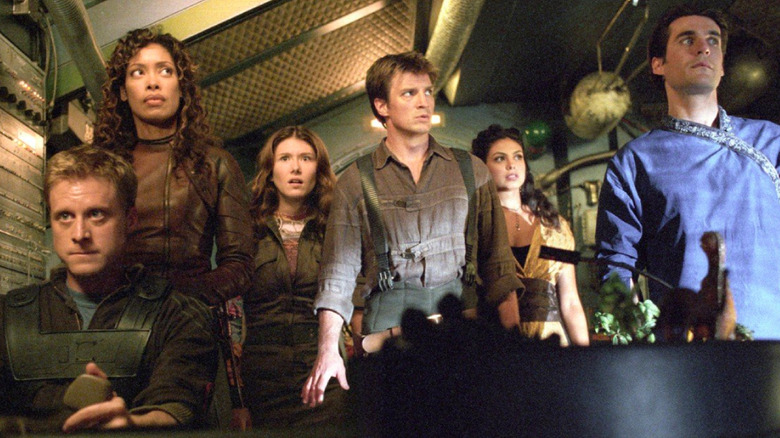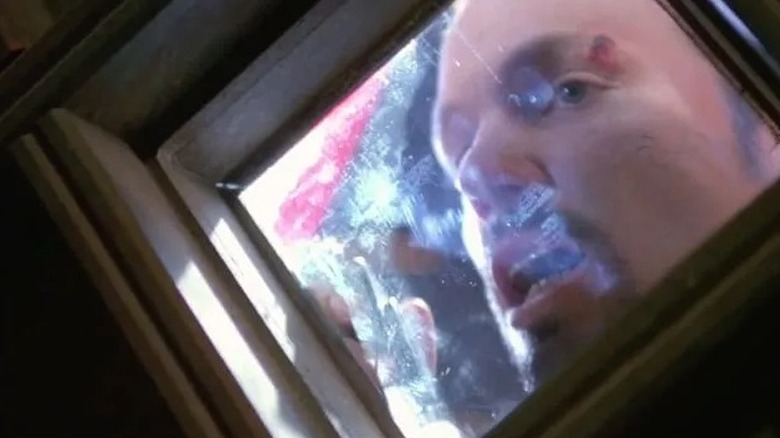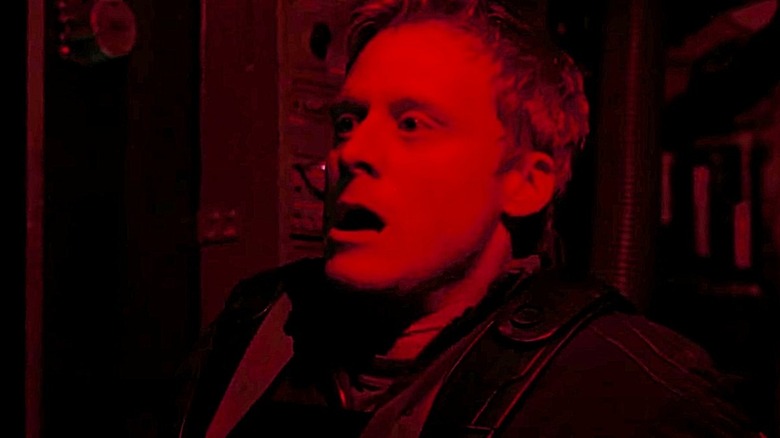Joss Whedon Made It Clear From The Jump That The Firefly Cast Was 'Expendable'
"Firefly" broke a naming pattern. Creator Joss Whedon's previous TV series were named for their protagonists: "Buffy The Vampire Slayer" and "Angel." "Firefly," on the other hand, is named for its setting; the Firefly-class spaceship Serenity. The ship itself is the main character since it's the glue that holds all of the cast together.
Whereas "Buffy" was a hero's journey, "Firefly" is an ensemble. The supporting characters are as important as Serenity's captain, Malcolm Reynolds (Nathan Fillion). According to Adam Baldwin, who played the crude mercenary Jayne Cobb, there not being a single main character also meant none of the cast had the extra job security a lead actor usually does.
Adam Baldwin explains the title
"Joss Whedon: The Biography" by Amy Pascale features a quote from Baldwin, recalling what Whedon told the cast at the outset of the series: "You're all expendable. If I choose, you can go at any time." Whedon could always be trigger-happy but there had been limits. "Buffy" season 5, which at the time looked to be the show's last, ended with the heroine's death. Come season 6, she was resurrected. You can't have "Buffy the Vampire Slayer" without, well, Buffy the Vampire Slayer. With "Firefly," though, no one was safe.
At the "Firefly" 10th anniversary special, "Browncoats Unite," Baldwin recounted how knowing this made him fearful while shooting "Ariel." In this episode, Jayne sells out Simon (Sean Maher) and River (Summer Glau) to the police. Mal nearly sends him out of an airlock until Jayne shows his regret is real. Though Jayne survives, Baldwin realized how easily he could be out of job. So, he decided he needed to make his character "lovable."
Now, since "Firefly" was canceled after a mere 14 episodes, Whedon didn't have the opportunity to follow through on his threat. When the series got a second chance in the film "Serenity," he made up for this. Shepherd Book (Ron Glass) and Wash (Alan Tudyk) both meet tragic ends in the film. It's unclear if this is because Whedon had plans to kill those characters off later on in the series.
Parts of the unfinished plans for the series included Inara (Morena Baccarin) suffering from a terminal illness — and the licensed novel "Firefly: Life Signs" ran with this. In the novel, Inara survives, but if the story had been realized in the series itself, she might not have been so lucky.
Is this approach wise?
"Firefly" has the best cast-wide chemistry of Whedon's shows — all of the show's enduring charm comes from the main characters and the actors playing them. The nine-member troupe was lightning in a bottle, so killing characters, and disrupting that dynamic, would've come with great risk. By the end of "Serenity," Wash and Book's deaths feel like gaping voids, no matter that the movie turned out to be the last hurrah for "Firefly" onscreen.
Whedon's body of work has come under increased scrutiny since revelations about his personal conduct have leaked out. Some of his trademarks, including killing characters, are now more scrutinized than in his heyday. Take the death of Tara (Amber Benson) in "Buffy" season 6, which combines the "Stuffed In The Fridge" and "Bury Your Gays" tropes. "Buffy" took a big step forward for LGBTQ representation, then took two steps back.
Like Tara, both characters' demises in "Serenity" feel like Whedon killing them because he can kill them, Wash especially. Serenity's pilot is killed mid-sentence by a Reaver speargun, one of Whedon's trademark anti-climactic, unexpected deaths.
According to James Marsters (who played the breakout character Spike on "Buffy" and "Angel"), Whedon responded poorly to network requests to keep his character around; Spike was meant to have a five-episode shelf-life. Whedon shoved Marsters against a wall and told him, "I don't care how popular you are, you are dead!" Now, Marsters doesn't hold the incident against Whedon. However, this mixed with the "you're all expendable" warning hints that Whedon enjoyed the power thrill of being able to kill his characters, and not always in flattering ways, a little too much. It's probably for the best that he didn't get a chance to flex that power more with "Firefly."


